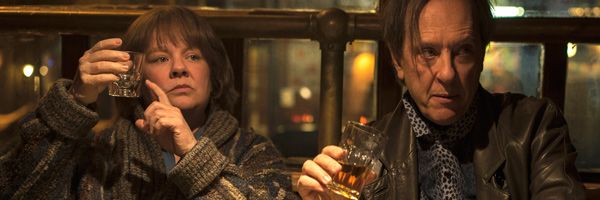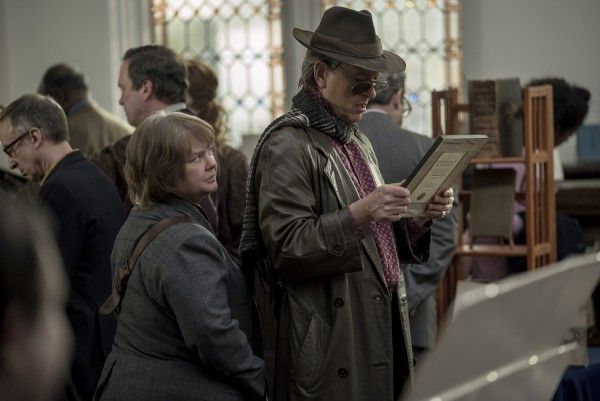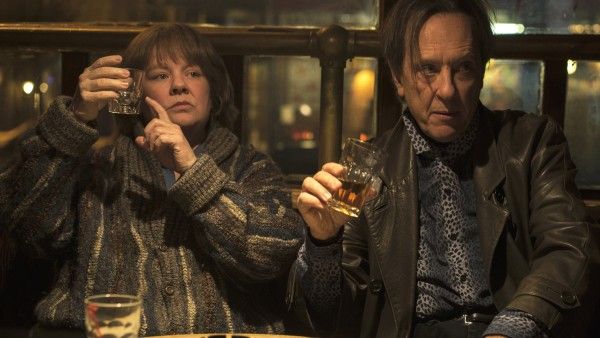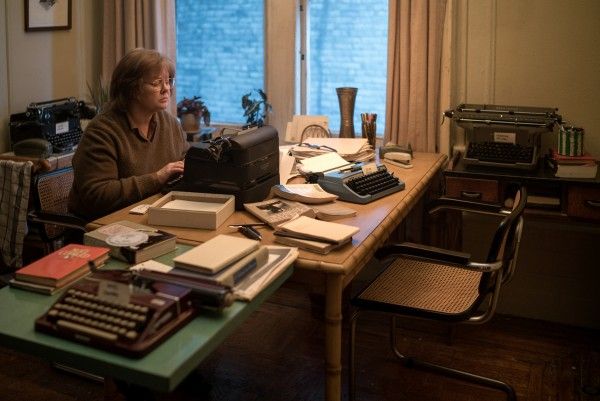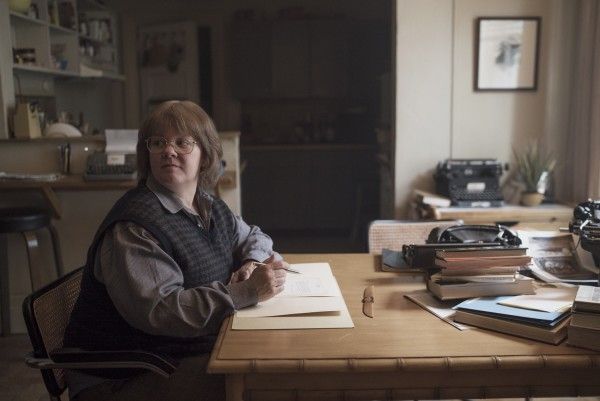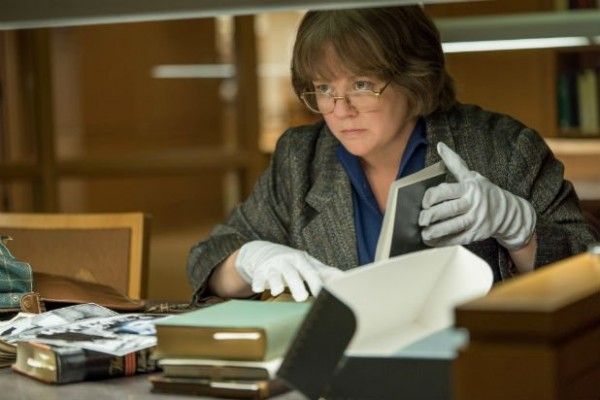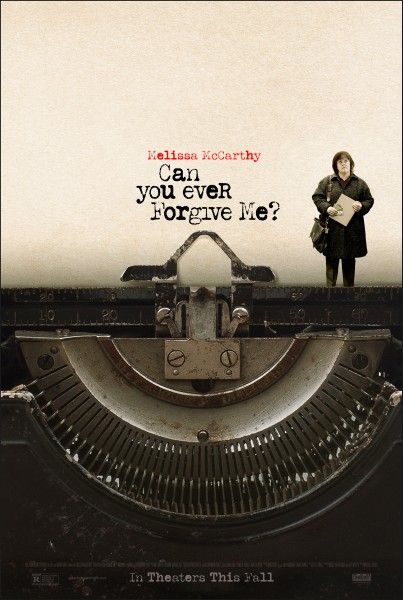Based on the memoir written by Lee Israel, the real-life dramedy Can You Ever Forgive Me? tells the story of Lee Israel (Melissa McCarthy), who made her living in the 1970s and ‘80s as a celebrity biographer writing about such subjects as Katherine Hepburn, Tallulah Bankhead, Estee Lauder and journalist Dorothy Kilgallen. But when she found herself unable to get published, the rent quickly falling behind and her beloved cat becoming ill, she started using her writing talent for deception as a literary forger, all while abetted by her loyal friend Jack (Richard E. Grant).
During this 1-on-1 phone interview with Collider, actor Richard E. Grant talked about what he thought of this wild true story, what drew him to Jack Hock, the weight of responsibility that comes with playing a real person, what it was like to have Melissa McCarthy as his partner in crime, and the very female-centric environment on this production. He also talked about how he found out that he would be in the next Star Wars movie, Episode IX, the scene that he read for his audition, the first time he met J.J. Abrams, and what it’s like to be on the sets at Pinewood Studios, along with the process of becoming Shiver for The Nutcracker and the Four Realms.
Collider: I tremendously enjoyed this movie. What a fascinating story with colorful characters.
RICHARD E. GRANT: Thank you!
This is one of those stories that would seem totally far-fetched, if it didn’t really happen. When you read the script, what was your impression of Lee Israel and her story?
GRANT: Well, I had read her biography of Tallulah Bankhead, so I knew her name, but I had no idea that she had this literary forgery life, at the end of her career. As you said, truth is always more bizarre than fiction. You couldn’t make it up. Having just found a letter, trying to write about Fanny Brice when her agent has said, “Nobody wants to read a book about Fanny Brice. Get real!” So then, she steals the letter and that inadvertently leads her into a life of crime, out of desperate financial necessity. What I loved about it, when I read it, was that it feels like a buddy road movie, but it just happens to be between bookshops and bars in New York City, circa 1991. When I first read the script of this oddball relationship between two very opposite characters, who were so linked by profound loneliness and failing upwards, they reminded me of Ratso and Joe Buck in Midnight Cowboy. They’re in the City of Dreams, or the Land of Oz, but they are really lonely and just desperate to make a buck, and they end up having this co-dependent, oddball relationship.
There’s something so interesting about watching someone who looks as un-colorful on the outside as Lee Israel does, but you see this colorful life that they’re leading.
GRANT: Yeah. Every day, you walk down the street and you pass people that seem nondescript, and then, of course, you find out that there’s all of this stuff going on. It’s a bit like what John Lennon said before he was murdered, that life is what happens in-between your plans. That seems so apt to what happened to these two people. They might never have been friends, but they became friends.
What did you like about Jack Hock, right from the beginning, and what did you grow to like about him, as you delved deeper into him?
GRANT: When I got to the end of the script and he was HIV-positive, it made sense. And then, I found out, from [Lee Israel’s] memoir, that he died at the age of 47 in 1994. I know people like Jack, that you don’t want to lend money to, or the keys to your apartment or your car, but there’s something about them that is so likable and engaging and charismatic. They live for the moment, on the day, and if there’s some scam or thing that they can do, they’re up for it. It just seems instinctive and in-the-moment. They’ve got money in their pocket, but they’re not thinking about keeping it for a rainy day. It’s like, “Come on, let’s go and do this right now.” That is a very impetuous, childlike, almost adolescent policy to think, “I’ve got some money left. Let’s go on the fairground of life and have a good time.” When he meets Lee, Jack says to her, “Life is dreary. Life is grim. Let’s go shopping. Let’s go and do something!” I think that’s a very endearing quality. That’s very attractive to play. I was very attracted to that.
When you play a real person in a real story, do you think about the weight of the responsibility of that?
GRANT: Yeah. I knew that he was from Portland, from the book, and that he was 40-something years old when he died. He was blond, tall, and had a small, stubby cigarette-holder, believing that, as a chain-smoker, he wouldn’t get cancer, as a result of doing that. So, I thought that projected an image of a certain self-confidence and looseness, in the way that he lived his life. He was getting all of these clothes from the early ‘80s, but that were all past their sell-by dates by the early ‘90s. More than anything, it was the fact that he says that all of his friends are dead, which we subsequently realize is from AIDS, and being disenfranchised and probably abandoned by his family. There are no photographs of him. There’s nobody living that knew him or could tell me about him. That reminded me very, very poignantly of and actor that I was great friends with, called Ian Charleson, who played this Scottish runner who wouldn’t run on a Sunday, in the movie Chariots of Fire. He died of AIDS in 1990, and he had a combination of incredible scallywag and vagabond promiscuity to his character. On the other hand, he was incredibly engaging, great fun, and had a little boy lost quality to him, so that you forgave whatever he did or said. I thought, if anything, from my interpretation of this part, in my head was a homage and reference to that person, and that generation of men that were just wiped out by that terrible disease. In the era of same-sex marriage now, in major cities, you take that for granted, but when you look back, you go, “It wasn’t that long ago that you could go to New York City and there could be people on the street that were literally abandoned.” So, yes, I did think about that.
This is such a great character piece that’s a really human story with no flash and no special effects. What was it like to get to partner with Melissa McCarthy to shoot this?
GRANT: It was a nightmare! Can you imagine going to work with her, every day? She’s mean, she’s unkind, she has bad breath, she’s late, she never knows her lines. It was just awful. It required all of my professionalism and patience to go to work with her. No. She was just fantastic.! I know actors say this and you get the press line of, “Oh, we’re a happy family. We had such a good time.” But, we genuinely did. The days that I wasn’t working, we would have lunch together. She was as good as it gets. I absolutely loved her. And she embraced the character. She left all of her vanity at the door and played her with a gray-roots wig, no make-up, dowdy clothes, curmudgeonly, prickly, and everything that Lee Israel was. I hope she wins everything going.
This film is directed a woman and written by a woman, had female producers and was edited by a woman. There was definitely a very female-centric environment. Have you ever been on such a heavily female film set before this, and what was that experience like?
GRANT: I have. The first film that I worked on with a female director was The Portrait of a Lady with Jane Campion, in 1995. And I just finished a movie in Australia (called Palm Beach) that was written, directed and mostly crewed by women. That was made by former actor-turned-director Rachel Ward, who’s married to Bryan Brown, who’s in the movie, as well. And coming from a kingdom where there’s a queen on the throne, and where we have a second female prime minister, and I live with a wife and daughter, I’m used to being bossed and given instructions by ladies. It felt like my home away from home, being on this movie. As you have pointed out, it’s hit the zeitgeist of the #MeToo movement, making a movie about a female character that is not a babe or a superhero. She’s somebody who’s the anti-hero and the antidote to all of those things, and yet is incredibly compelling.
You’ve talked a little bit about being in the next Star Wars movie, Episode IX, which I know you’re sworn to secrecy on, as far as any details go, but without revealing anything, how does it feel to you, personally, to be a part of a movie like that and to work with J.J. Abrams?
GRANT: Completely surreal. I had seen the movie when I was a drama student in 1977, and I’d never seen anything like it. If you had told me then, with a crystal ball, that 40 years later, I would be in the movie, I wouldn’t have believed it. Also, in 1991, when I was doing Dracula in L.A. with Gary Oldman and Francis Ford Coppola, I’d gone to a movie called Rambling Rose with Laura Dern. I keep a diary, and I have this diary entry that said, “Met 24-year-old J.J. Abrams – incredibly self-confident, self-possessed and rich.” He told me that he had a three-picture deal. He just had a big hit with Regarding Henry, starring Harrison Ford and Annette Bening. So, when I then got a call, 13 years later, that said, “J.J. Abrams wants to audition you for this thing, and will you come and meet him at Pinewood Studios,” I reminded him of our meeting. Of course, he didn’t remember that. And when you go to the sets, which are at Pinewood Studios, and you see that it’s not green screen everywhere, and you actually see the things that you have grown up seeing in the movies, every day that I’ve worked, I’ve said, “J.J., pinch me.” And he’s as excited as anyone to be there. He’s 52, but he’s as excited about directing and writing this, as you’d expect any movie geek kid would be. That is very endearing. You go, “Well, I get that because that’s how I feel.”
You’ve also said that you initially had no idea that you were even auditioning for Star Wars. What did you have to do on your self-tape?
GRANT: I was sent an interrogation scene that was generic. I could tell by the language that it was from a 1940s war movie. So, you self-tape it and you send it off, out into the ether, and you usually never hear anything. A few months later, I got a call saying, “A car is gonna come pick you up.” And I was like, “What the fuck is that?!” They said, “You have to go meet J.J. Abrams at Pinewood Studios.” I thought, “Well, okay, but what do I have to go and do?” And then, five minutes after meeting him in his office, he said, “So, are you gonna do the part?” And I said, “What part? Tell me!”
That’s awesome! What an incredible experience to have a memory like that. How fun! I also love the poster of your character for The Nutcracker and the Four Realms. What was the experience like making that film, and who is Shiver?
GRANT: That was three hours of make-up. He’s called the Regent of Winter, or Snow. There are these four realms, and Eugenio Derbez plays the one with the flower kingdom. He’s hilarious. We are sort of Laurel and Hardy. I have to be very serious and Mr. Iceberg, and he is Mr. Explosive Flower and a flowery in all directions character. We are dealing with Clara, and her journey through the story. It was incredibly enjoyable to do that because the sets were jaw-droppingly beautiful and not all green screen. With the costumes and the sets, you knew that you were in a big-budget Disney movie, on a scale that I never, ever thought I’d be involved in. And then, subsequently, I did Star Wars.
Can You Ever Forgive Me? is in select theaters on October 19th.

